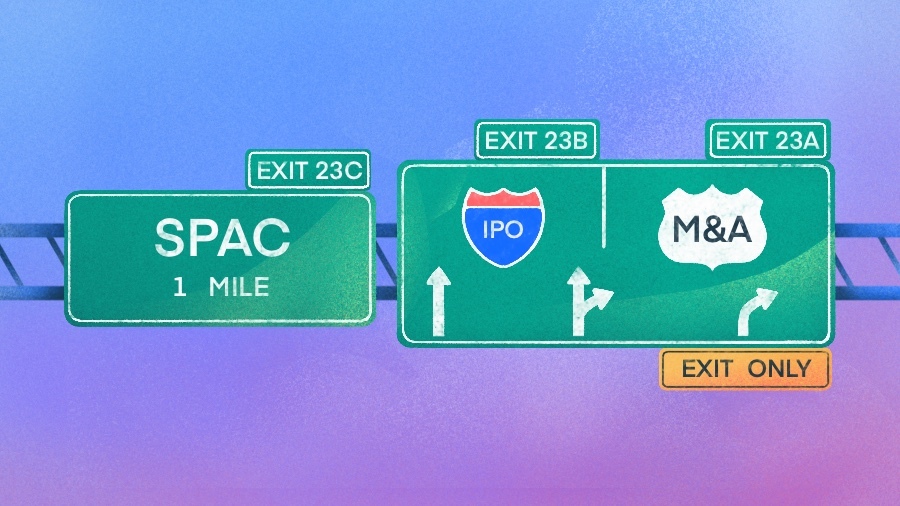The venture capital ecosystem faces a severe liquidity crunch. But although the IPO market shows new signs of life, startup investors should be looking to M&A this year to bring more capital back into the system.
That’s the view from Ryan Hinkle, managing director at New York-based startup investor Insight Partners, one of the most active investment firms in the bull run in private tech companies in 2021 and into the first half of 2022, when the firm announced its $20 billion fund, its largest to date.
The current liquidity shortfall in the startup world stems from the lack of exits in the market. As a whole, the limited partners who invest in venture funds are sitting on pools of illiquid assets held by the funds they invested in.
 Ryan Hinkle, managing director of Insight Partners
Ryan Hinkle, managing director of Insight Partners“People that manage money on behalf of others have faced multiple years of lower liquidity and that has ripple effects throughout all the markets, because that liquidity is supposed to be tomorrow’s commitments to new funds,” Hinkle said.
Until IPOs and M&A deals unlock those funds, it’s hard to imagine the ecosystem returning to a more normal state where startups again get funding after several years of declining venture investment.
“A commitment today is a return in three to five years, becomes a new commitment in three to five years. And so the cycle spins,” Hinkle said. “That wheel has stopped spinning, or at least slowed dramatically.”
Exits are key to unblocking the whole system, but IPOs are still few and far between. In any case, IPOs don’t offer liquidity the same way a merger or acquisition does, he noted.
Hinkle joined Insight more than 20 years ago and recently spoke with Crunchbase News to share his outlook for startup investment and the approach to liquidity in this market.
This year, he expects ramped up activity with private companies buying other private companies, more so even than an uptick in public companies acquiring startups in 2024. That would release capital to LPs.
Since the funding heyday of 2021, Insight has pulled back on its investment pace. But its investments back then mean it’s still the fifth-most active investor listed on The Crunchbase Unicorn Board by funding counts in still-private billion-dollar valued companies. It likely has a very large portfolio of illiquid assets.
Founded 28 years ago, the firm had $80 billion under management at the end of 2023, giving it a wide aperture to invest in software.
Some of its largest exits over time are X (previously Twitter), which went public in 2013; Delivery Hero in 2017; and Monday.com in 2021, exits dating back many years.
Market dislocation
The absence of exits for venture-backed startups has led to a slower funding environment, layoffs and companies ultimately shuttering as follow-on funding dries up.
But while IPOs generate a lot of headlines and excitement, they actually don’t really solve the liquidity crunch, Hinkle said.
“IPOs are not liquidity events. It’s a total misnomer,” he said. “An IPO is a financing event.”
That’s because since the last downturn, many investors have not sold their holdings as part of the IPO process. Getting out of a large position in a public stock can be challenging, Hinkle noted.
Investors can get liquidity from secondary offerings later on, but many IPOs do not have secondary offerings.
“The value-optimizing path is an IPO,” said Hinkle, but that is only the beginning of a liquidity journey.
“The fastest path to receiving dollar liquidity is to sell a company,” he said.
A recent Kauffman Fellows investment sentiment report concurred. Investors surveyed there also said they’re looking to M&A and, in this constrained market, are looking to sell bets on the secondary market for liquidity this year.
Uncertainty in the IPO markets
Companies are generally advised to have eight quarters of predictable revenue moving forward in order to go public.
“If ever there was a hard time to have predictability, it’s right now,” Hinkle said. We are “one bad geopolitical event away from uncertainty, one bad inflation data point.”
And in this market, many companies face an IPO price below their most recent round, which makes it difficult for investors to come to terms if they invested at higher values.
“When valuation gets hit, well that throws everything out the window,” said Hinkle.
It takes a special company to go public with different constituents involved in the IPO process, he said. Underwriters are focused on value. Management is focused on preparedness. Investors are focused on the upside and downside, and boards are focused on long-term vs. short.
Current uncertainties make it difficult for decision-makers to pull the trigger.
Beyond the reset
While the capital markets do not provide a short-term liquidity path for investors, the public markets have imposed a forced austerity on companies, he said.
“The lasting legacy and benefit of this reset will be that the companies emerge from this when markets are truly normal with a different efficiency mindset that will never go out of style,” Hinkle said. “That efficiency mindset will create better outcomes long term.”
Related reading:
- IPO Market Insiders ‘Cautiously Optimistic’ That Current Trickle Will Get Stronger
- Secondary Market Seeing Rebound After Slowdown
- Startups Are Still Buying Fewer Startups
Illustration: Dom Guzman

 9 months ago
42
9 months ago
42